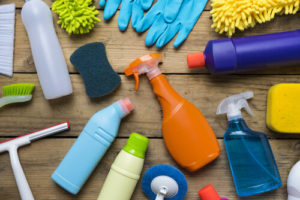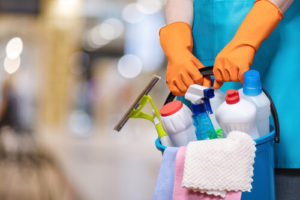Cleaning Safety 101: How to Safely Handle and Store Cleaning Products

However, although both conventional and green cleaning solutions are perfectly safe when used correctly, improper handling and storage can still lead to accidents. Taking the right precautions is vital in order to make your regular and deep cleaning in Groton, CT, as risk-free as possible.
In previous articles, we discussed the most common reasons why people book professional cleanings and provided you with a list of crucial traits to look for when hiring a cleaning company. Now we’ll answer some frequently asked questions about how to safely use and store cleaning products. Read on!
How do you safely store your cleaning chemicals?
Cleaning chemicals should be stored inside a dry area (preferably a cabinet or similar container) that isn’t exposed to temperature extremes. Keep them out of sunlight and away from sources of heat such as HVAC vents, ovens, fireplaces, and so on.
Essential things to keep in mind when storing cleaning products include:
- Keep them away from children and pets. If you have small children or pets, always store your cleaning supplies on the shelves or inside cupboards that are too high for them to reach. Needless to say, this isn’t necessary if you clean using food-grade items such as white vinegar, baking soda, and lemon slices.
- Refrain from mixing cleaning chemicals. Mixing cleaning liquids can result in unpredictable chemical reactions, some of which may even be dangerous. This includes using different cleaning cloths for different chemicals.
- Don’t store them in another container. The packaging cleaning chemicals are sold in has specific properties that make it the safest possible option for the products they contain. For this reason, you should always keep cleaning chemicals in the bottle they were originally packaged in.
How often should you replace cleaning supplies?
It depends on the products in question. Store-bought chemicals usually have an expiration date of 6-24 months, so it’s very likely that you’ll use them up long before they have a chance to expire. In any case, the expiration date should be printed on the label.
If the label has worn out or the cleaning solution isn’t in its original packaging, it’s strongly advised that you throw it away and purchase a replacement.
How often should you change your cleaning cloths?
As a general rule, when the fibers on the microfiber cloth start to be thin and scratchy, it’s time to replace the cloth. Other types of cleaning cloths should be thrown out when they lose their absorbency. However, if cared for properly, they can easily last for years.
Here’s how to care for your cleaning cloths:
- Wash them using liquid detergent (or no detergent at all)
- Don’t use hot water, bleach, or fabric softeners
- Refrain from washing them together with other fabrics
- Make sure they stay dry when you’re not using them
Where can I schedule an extensive deep cleaning in Groton, CT?

Here at Orchid Maids, we’d like to make your life easier by sending the very finest cleaning experts in Groton straight to your doorstep. Our pros will happily give you the gift of a sparkling clean home while you enjoy a relaxing stroll by the beautiful Branford House at UCONN Avery Point with your loved ones. Call us today!